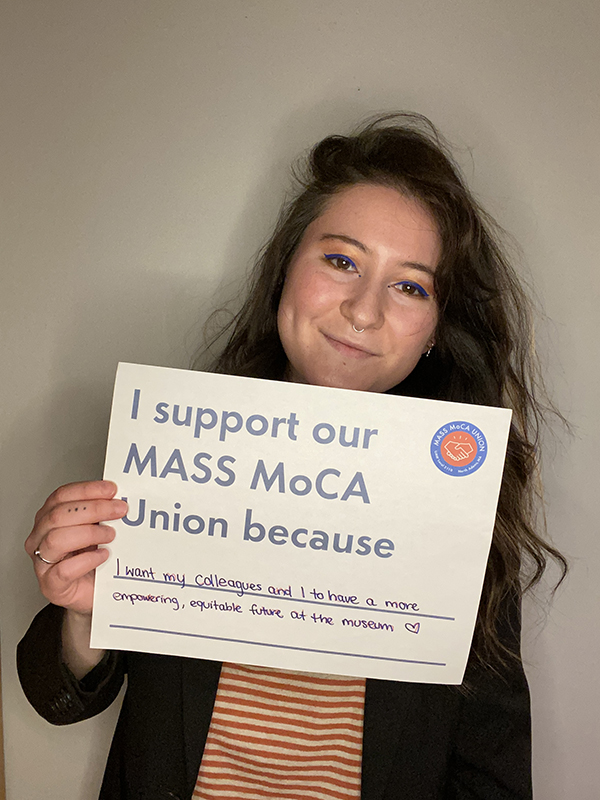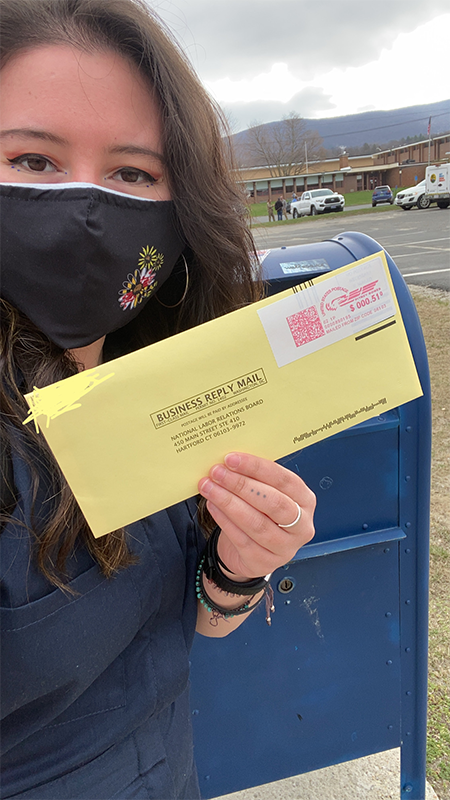Podcast (top-left-corner): Play in new window | Download
Hey, Greylock Nation!
This is episode #167 of the Top Left Corner, published Tuesday, August 16, 2022, rather late in the evening. I’m your host, Jay Velazquez, also known as the mongrel, and I thank you for tuning in.
I had a different show planned for this episode, but when I heard that the workers at MASS MoCA had plans to walk out this week, I scrapped the original script and got ahold of the MASS MoCA Workers Union, Local 2110 UAW to see if I could get an organizer on the horn and find out where things stand.
If anyone had questions about where I, and by extension The Greylock Glass, stands on the struggle for worker representation, any uncertainty should be cleared up in the next 30 minutes. This is advocacy journalism, and at this point in late stage capitalism, I am proud to confess it. I’m mean, c’mon — you’re either on the side of people being able to afford to eat or you’re not.
Oh, and speaking of being able to afford to eat, The Greylock Glass is expensive to run, not even including the salary I don’t get paid. Want to keep this independent alternative newsthing alive? Be. our. Sugardaddy. Or sugarmamma. Or, frankly, any kind of benign nonbinary custodial sugar persona that suits you and go to GreylockGlass.com/support and follow the link to membership and one-off contributions options. Thanks.
Now, on with the show.
CLICK HERE for Official release from the MASS MoCA Union—Local 2110 UAW
NORTH ADAMS — Unionized employees of MASS MoCA voted by a 96% vote to engage in a one-day work stoppage on August 19, 2022. Employees will be picketing the Museum all day and asking visitors to express support for a fair contract for staff.
The employees’ union, part of Local 2110 UAW, was formed in April of 2021 and has been in bargaining for the first union contract since last summer.
“We have asked our members to strike because MASS MoCA has not bargained in good faith on a fair contract for the employees who make it so successful,” said Maro Elliott, Manager of Institutional Giving and.a member of the Union’s Negotiating Committee. “We want an agreement with MASS MoCA that will create a more accessible, equitable, and just workplace.”
The average wage in the bargaining unit is $17.30 per hour and two thirds of the unit make under $15.50 per hour. According to The Economic Policy Institute’s family budget calculator for a modest living in Berkshire County, a single individual with no children needs to earn $40,000 per year. The Union is seeking a minimum rate of $18 per hour for the first year of the contract and increases in 2023 and 2024 that would raise staff closer to $20 per hour by the end of the contract. The Museum is proposing a $16 per hour minimum and no guaranteed increases in 2023 and 2024.
“Many of us live locally in North Adams. By raising hourly rates to something more livable, MASS MoCA would not only be supporting its employees, but helping lift the community,” said Isabel Twanmo, a Box Office Representative who has worked at MASS MoCA since 2018 and is on the Union’s Negotiating Committee.
Local 2110 has filed unfair labor practice charges against MASS MoCA with the National Labor Relations Board, citing the Museum’s bad faith bargaining. Earlier this summer, MASS MoCA was forced to settle an initial charge filed by the Union because of its refusal to grant a regularly scheduled annual increase to unionized employees after the union was voted in. The Museum was ultimately forced to grant the increases retroactively and post a public notice about doing so. The Union filed another charge when the Museum promised additional raises to individual employees if they convinced the union to lower its wage demands.
“Throughout months of bargaining, MASS MoCA’s representatives have been antagonistic toward our union, telling us the arts and artists come first. We all love MASS MoCA but we also have to live,” said Elliott.
In April 2021, the MASS MoCA staff voted overwhelmingly to unionize with UAW Local 2110. The bargaining unit includes approximately one hundred full-time and part-time employees who work as educators, curators, custodians, museum attendants, box office staff, art fabricators, technicians, and other administrative and professional staff. UAW Local 2110 is a technical, office and professional union that represents many museums and cultural institutions in the northeast including the Museum of Modern Art, the MFA, Boston, the Portland Museum of Art, the Whitney Museum of American Art, the Guggenheim, the Jewish Museum, the Harriet Beecher Stowe Center, the Brooklyn Academy of Music and many other non-profit and educational institutions.
NTRVW: Isabel Twanmo, Negotiating Committee member
Editor’s Note: The Greylock Glass pays to have rough transcripts of interviews produced. We attempt to remain as faithful as possible to the speakers’ original meaning, and apologize for any errors of transcription. That said, even the imperfect transcription we perform is costly. Please support us financially by becoming a member or making a one-time contribution to help us continue to provide this service.
Top Left Corner: With me on the line is Isabel Twanmo, who is going to be joining her brothers and sisters on the picket line on August 19th at MASS MoCA. Thanks for coming on the show, Isabel.
Isabel Twanmo: Thank you so much for having me, Jason. It’s an honor. I’m really happy to be here.
Top Left Corner: Well, the honors all mine and anything we can do to to get the message out, because a lot of people feel like unions are a thing of the past or an anachronism that, you know, we don’t need them anymore. But clearly, that doesn’t seem to be the case with a lot of folks in the museum space, because Mass MOCA is one of many museums that have voted to to organize over the years. Give us a brief history, if you can, Isabel, about how this came to be when the organizing started.

Isabel Twanmo: Yeah, so we started the process actually in the early summer of 2020. We were all laid off from Mass MOCA in March 2020 and that was really jolting. I think that really woke us up and really got us thinking more seriously about the process. We started seeing other museums unionizing or starting the process or have already unionized. And it it really inspired us. And so we started meeting with representatives from Local 2110 part the UAW. And then in, let’s see, April of 2021, we officially voted the union in. It was it was a really positive vote, I think it was. What was it like, 50/50 to 15 nos? Something like that. I could have the numbers a little off, but and then we started bargaining in October of 2021, and we’ve been bargaining ever since. It’s been almost a year now. So it’s come to a time where we’ve started to really see Mass MOCA’s management push back. And so we figured it was we, we felt it was time for a strike.
Top Left Corner: Yeah, well, let’s, let’s, let’s go back to the very beginning and let’s talk a little bit about what was going on as much as you can in a way about the early days of the pandemic and how management at the museum handled that. I know I spoke with some folks who wouldn’t go on the record at the time describing some of management’s tactics to try to get people to keep working in conditions that were not necessarily in line with public health officials directives and and some some kind of shady business there. So what sorts of things really prompted discussions on on the subject of this? These actions are not responsible management behavior. These are the things that we need to to put a stop to. What were those things?
Isabel Twanmo: Yeah, I mean, this was a very unsure, precarious time. No one knew what they were doing. But I think it was very clear that we were in a very dire situation. People are getting sick, people are dying. And so as as a front facing worker, I was sitting at the box office in March feeling very concerned for myself, for my colleagues, for our visitors that were coming through the door. And I think once once it looked like we would have to shut down, there was a lot of question of whether to keep the staff, whether they could. So we were getting a lot of mixed messaging from our management. And first it was we’ll try to keep you for a couple of weeks, oh, maybe longer. Oh, a lot of mixed messaging. And then, you know, a few minutes would go by and we get another message saying, all right, we got to wait. We have to lay you all off. So that was it was it was really frustrating. I think, you know, we have employees that have worked there for 20 years, you know, since the museum’s when it first opened. And so speaking from a front facing side of things, it was just it was startling.
Isabel Twanmo: But, you know, conditions weren’t safe. So. I think we all went into lockdown and we. I think the pandemic really woke people up to not only being laid off and how frustrating that was. We were seeing other museums and friends that other museums, they weren’t being laid off. They were being furloughed or even paid during that time. So I think we started sitting around and wondering like, well, why didn’t why didn’t Mass MOCA do that? Why aren’t we still employed, employed? Why are we in this situation where we don’t feel like we have any protection or any answers yet? And so when they did reopen, first off, they reopened very quickly. And like other institutions, we opened very quickly. But I think we reopened earlier than a lot of places. And so that in itself, we were all looking around thinking, you know, it seems a little too soon. And so we were still really unsure about our safety and still kind of holding this resentment that we were laid off so quickly. And it felt like the the museum panicked and we had to take the hit for it.

Top Left Corner: Now, there was talk originally that people would be able to return to work, but that’s not exactly what happened for everybody. If I recall, people had to sort of audition for the jobs that they had already had, the positions they held. Talk about that.
Isabel Twanmo: Yeah. So I was one of those people. I was laid off and then I was told that I would have to reapply for my job, which. That felt pretty insulting. I’m not going to lie. This was the job that I had been doing for a couple of years. I’d really dedicated myself to this job. I was working in visitor services as a visitor services associate, and I had really I felt like I connected more with the community through this position. And then to be told, you know, even though you carried this position for many years, you have to reapply for that. And there was no guarantee that we would get that job. So that didn’t feel too good. And then when I did come back, I didn’t necessarily get the same position. So, yeah, that that didn’t feel too good.
Top Left Corner: Yeah, it sounds it sounds unnecessarily draconian. It sounds like a power play to me. Yeah. You know, I’m sure that’s probably how it felt on the ground, too. And the thing is, a lot of the public, the the museum going public really was unaware of these these things because let’s face it, it’s MASS MoCA. They’re the good guys, right? I mean, it’s it’s arts and culture. You know, we love arts and culture. This is the Berkshires. And I think that that I heard and again, a lot of people were this is very early on. People were not. They were afraid to talk. They were afraid that there was going to jeopardize their positions, their chances of being rehired. So unfortunately, there was a lot of stuff that people told me that I’ve had to keep under my hat because I you know, they it was all off the record, which is really too bad because if it had been on the record, maybe things would have been improved quicker simply because the public would have heard what kind of behavior was going on in the management conference around the conference table. So this would not happen in a lot of industries where, you know, it’s just a job. Right? And I punch in, I do my work, I punch out, I go home. But the thing is, it isn’t just a job, is it? For most of the people that work at Mass MOCA, it’s more than a job.
Isabel Twanmo: Yeah, I would I would agree with that. And I think what you said earlier about how the outside perception of museums, especially these enormous influential museums like Mass MOCA, you would think they would be paying their workers appropriately. You would think, you know, a lot of people see Mass, MOCA or a lot of larger contemporary institutions as sort of these, for lack of a better word, elite, elitist institutions which have a lot of money. And so you’d think their staff would be paid properly. You think they’d have proper working conditions and they’d feel empowered in their jobs. But unfortunately, that isn’t always the case. So at at Mass MOCA, we do have employees, many of which who live in the community, who contribute to the community, who really love Mass MOCA, who care about Mass MOCA, who aren’t seeing that that love returned to them and aren’t seeing, you know, the the return for, for how much they give.
Top Left Corner: Yeah. It’s it’s the case that people are are dedicated. They’re committed because they believe in the mission. You know, if you go work at a fast food restaurant. It has to be one special fast food restaurant for you to say that you believe in the mission. Right. Right. But the fact of the matter is, you can go work in a fast food restaurant and make more than you would. Doing what you’re doing, you know, at Mass MOCA, in many cases, I’m looking at this. The press release I’m holding says that the average wage in the bargaining unit is 1730 per hour, and yet two thirds of that unit make under $15.50 per hour. That’s for 1550. And I’m glad that you that you link to the Economic Policy Institute’s family budget calculator, which can send into the news a couple years ago, because it it showed that there’s nobody who’s there’s not a single apartment that you can rent that you can afford on minimum wage around here. There’s no way that a a say a single parent with one child can afford to live on these wages. It’s it’s really you know, we think about the arts and culture and we think about them as these sort of liberal, you know, maybe even progressive institutions. And yet they don’t they don’t actually behave that way, at least not when it comes to the help. 1550 an hour. Give us a sense of what I mean. I know what it feels like to live in 15, 15 and 15 averages for those folks in the listening audience who’ve never had to just describe a lifestyle based on 1550 per hour. Just be brutally and be brutally honest.
Isabel Twanmo: So to back things up by a couple of years, when I started at Mass MOCA, I started working part time, but part time and some days I was working five days a week, but with just a shorter shift each day. Within two months of starting my job, I realized I didn’t have to just get a second job. I needed a third job. So for many years I was working six days a week. Sometimes I get pulled in to cover shifts on that one free day a week that I had. So I didn’t feel like I had a social life. I felt a lot of stress and tension all the time, wondering how I’m going to pay my bills. Despite working six days a week, no one should have to feel insecure when they work that much. But of course, I love MASS MoCA. I was so excited to be working at this fantastic renowned institution, and I still love working there. I still love MASS MoCA. But again, we we need to live too. We need to be able to pay our rent. We need to not feel like we’re working. We’re living paycheck to paycheck. Like we don’t know whether we can afford our full grocery list each week and that it doesn’t make you feel good. It doesn’t make you feel secure in your life. And so we are very much pushing for a living wage so that many of my colleagues are on food stamps. We don’t want them to be on food stamps. We want them to feel comfortable that they could feed themselves, that they can treat themselves every so often. And right now we don’t feel like we can do that on the wages that we make currently.
Top Left Corner: Yeah, that’s that’s the thing. I mean, and remember, in America, the greatest sin is being poor. I mean, there is nothing that’s going to get you scorn faster than being poor. And that’s even when you’re working, right. People, they figure that you must be doing something wrong if you’re not getting paid more or, you know, it’s a really it’s this somehow between like 1975 and today, maybe even 1980. And today, we’ve been brainwashed into thinking that workers don’t deserve a living wage, good conditions being treated like human beings. Right. And when the when the museum released its statement, once that vote occurred and the union was brought in, the statement was very rosy. You know, we’re going to work with our our the the local to to make the best possible situation for everybody involved. And we look forward to. And I knew really looking at that that that meant they’re sitting there trying to figure out how they can wiggle out of this. And the way they’ve been doing that, as you say in this press release, is they’ve been stalling. Describe the last 11 months or so of of non progress in the negotiations.
Isabel Twanmo: Yeah. I mean, the first thing that comes to mind in between bargaining sessions, they’ve had us wait all the way up to seven weeks until we’re back at the table. Our last session we had, I believe it was a four or five week window between sessions. That’s that’s too much time in between. And then when they do bring when they do make moves on proposals, it’s very small. They might change a few words here and there. But ultimately, Mass MOCA’s management is not making significant moves on their contracts in the same way that we feel we are. And at this point we’re bargaining against ourselves, which at the end of the day that’s unfair bargaining. And so we don’t really appreciate that. We don’t appreciate being strung along for so long when we want to bargain fairly. We want Mass MOCA to bargain fairly as well. We want this to be a smooth and collaborative process, but we’re not seeing that same energy on their side.
Top Left Corner: Hmm. Yeah, it’s. It’s it’s an old game that they’re playing. And I think, if I recall, I think that when there was a union. When it was long before it was a museum. I think it was I think it was known as a company union, which basically is a sort of a puppet organization. It was a union in name, but it actually worked on at the behest of the company. And I don’t know enough of the history to go into it, but it sort of was a way of a steam valve so that the workers could sort of vent. But at the end of the day, nothing really happened. And it sounds to me like the management of Mass MOCA is kind of wishing for that, sort of let them let them, you know, kick up the heels, let them fuss, let them fume. But at the end of the day, we’re not really going to let anything change that much. What are you asking for that they seemed so reticent to meet you ever?
Isabel Twanmo: I think the biggest thing right now are wages. We’ve been asking for $18 an hour and that was after we came down from $20 an hour. So we have been making significant moves to try to meet Mass MOCA in the middle. But at the end of the day, that wage needs to be a living wage. It needs to support our staff. $15 an hour is not a living wage in this area. I also want to mention North Adams is a lot cheaper than other areas. But with rising inflation, with rising cost of living, we’re making nowhere near what it takes just to get the minimum in Berkshire County. So that’s a huge area that we’ve been trying to work with Mass MOCA on, and it’s an area that they have been most reluctant to move or meet us in the middle. So again, making very minor changes to their proposals, sometimes not at all. And we just feel like we’re making moves on our own contracts and bargaining against ourselves, which doesn’t make any sense.
Top Left Corner: Yeah, it sounds like you are. You’re you’re really I mean, you’re shaving off a little bit by a little bit by a little bit, hoping that they’ll they’ll they’ll eventually sort of, you know, join the game here. And they’re just not they’re just not playing ball. They’re waiting to see how much will you give away before they even have to consider budging. And that’s that is not good faith negotiations whatsoever. That’s that’s I’m not I’m not going to use that. I mean, this is a podcast. I can say whatever I want. But so this action that you’re taking on the 19th, it’s a one day strike. What do you. First of all, what is the what is the the tactical? Sense of a one day strike. What do you hope will achieve and how will you know? How will you measure it? Success.
Isabel Twanmo: That’s a great question. Let’s see. So we really do want to strike because we feel that it is time. We feel like we don’t have a choice at this point. Mass MOCA has not been budging. So we felt like a larger collective action was necessary. Again, the one of the top things that we’re trying to push is for higher wages. So that is something we will be talking about on Friday. And in terms of measuring the success, I’m not quite sure. But we have seen strikes and successful outcomes from these collective actions at the MFA. And so we were really inspired to use this as a tool and to get the community together to show that we need a living wage. We’re not making that. And so that’s what we hope to achieve this weekend.
Top Left Corner: Well, what I hope is that any of my listeners who can make it over there, this is going to be going on all day. I would like you to go to Christos Pizza. There are Christos famous pizza over on Holden Street. They are our official pizza sponsor of The Greylock Glass. And and go buy a cheese pizza and bring it to the strikers at MASS MoCA. You’ll be easy to spot. You’ll be right there and out front, right?
Isabel Twanmo: Yeah. We’ll be right on the sidewalk in front of Mass MOCA on Marshall Street.
Top Left Corner: It’s a no question that you can find them, bring them some pizza. And and, you know, I wish I could say that, you know, I’ll give you a some sort of I don’t know what I’ll give you. I’m giving you free podcasts. I give you free podcast, you bring them pizza, pizza. And maybe because it’s going to be kind of hot out, I’m pretty sure it’s probably 85 or something. So maybe some some iced tea or or just water would be good. Maybe some. I don’t know. Maybe some. I don’t know. What do you what do you like? What do you like when it’s hot outside?
Isabel Twanmo: Oh, I love the idea of pizza. Please bring water. Please bring your voice. Please bring comfortable shoes. And please bring all the support that you can get your friends, your colleagues. I know there’s a lot of past Mass MOCA employees that live and work in town. Please come join us on Friday and be ready to use your voice.
Top Left Corner: Anywhere people can go to find out more besides The Greylock Glass, do you have like a Facebook or a social media, anything like that?
Isabel Twanmo: We have all of the above. We have a website at Mass MOCA union dot org. Let me double check that. That’s correct. Yes. Dot org. We also have an Instagram. It’s at Mass MOCA Union. Please follow that. We post updates, we post frequently asked questions, we post images of support. If you’d like to take a photo that we can post on our Instagram, we have printouts that you can fill out and hold up. We also have posters that you could download on the website. If you’re a local business and want to hang a poster that says We support the Mass MOCA Union, please print those out. Please put them in your windows and show the rest of the community that you support the Mass MOCA Union.
Top Left Corner: I think I’ll put a big honkin, big intrusive pop up on The Greylock Glass.
Isabel Twanmo: With that, please.
Top Left Corner: That everybody who goes The Greylock Glass can see that we support the Mass MOCA union. Well, Sister Isabel, I thank you for taking the time to talk with The Greylock Glass here in the top left corner. I will try to make it down to myself and make sure that you get pizza, even if I have to bring it myself. And and, you know, hey, in solidarity.
Isabel Twanmo: Thank you so much, Jason. This was a pleasure. Thanks for calling and I hope to see you on Friday.
Top Left Corner: Take care. Bye bye.


![Gardens with Round Stone Barn and Dairy Ell, Hancock Shaker Village; Photo by Bestbudbrian; [CC BY-SA 4.0 (https://creativecommons.org/licenses/by-sa/4.0)], via Wikimedia Commons](https://www.greylockglass.com/wp-content/uploads/2017/10/Gardens_with_Round_Stone_Barn_and_Dairy_Ell_Hancock_Shaker_Village-1024x680.jpg)













